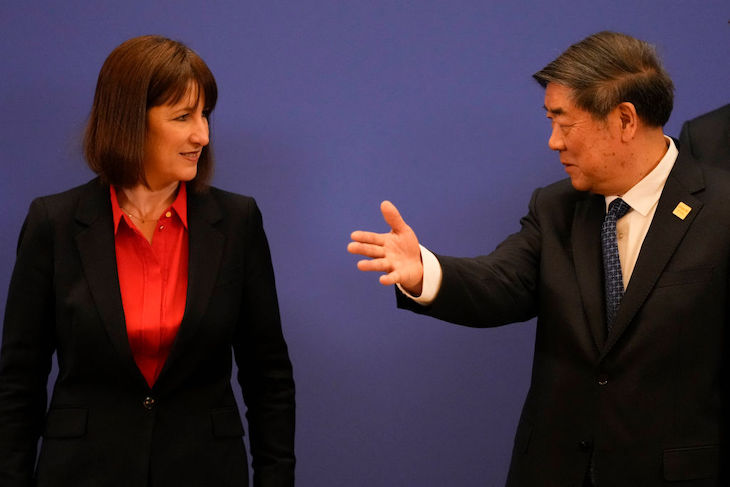When the security services accessed the mobile phone of Yang Tengbo, the alleged Chinese spy who became a confidant and business partner of the Duke of York, they found a document in which Yang said of the duke, ‘He is in a desperate situation and will grab onto anything’. We can only assume there are memos circulating in the Chinese Communist Party (CCP) this week describing the visit by Rachel Reeves in similar terms.
Starmer and his ministers appear to be competing to see who can kowtow the lowest before Xi
The hapless duke’s entanglement with Yang, whose exclusion from Britain was confirmed shortly before Christmas, was held up as an example of ‘elite capture’, the process by which the CCP targets and coopts influential figures in Western business, politics or academia – aided and abetted by greed, gullibility and a wilful lack of curiosity on the part of the target. In return, the ‘captive’ is expected to promote Beijing’s interests, or at the very least keep quiet about the CCP’s appalling human rights record.
The term is usually applied to individuals, but after Reeves’s performance, it seems fair to ask whether the Labour Party has now been ‘captured’ by Beijing, and by a Treasury and Foreign Office orthodoxy that appears terrified of causing any offence to Xi Jinping’s increasingly repressive and hostile regime in the desperate hope of some economic crumbs from the emperor’s table. Keir Starmer and his ministers appear to be competing to see who can kowtow the lowest before Xi, with Reeves edging ahead, declaring that Britain has ‘no choice’ but to engage more deeply with China.
Reeves’s excruciating Beijing performance also appears to pre-empt the Labour Party’s so-called ‘audit’ of the UK’s relationship with China, upon which future policy would supposedly be based. The audit, much hyped before the election as a way of bringing clarity to relations with Beijing – a ‘long-term and strategic approach to managing our relations’, as it was termed – began last August. There have been worrying leaks suggesting the audit has been pared back to reduce criticism of China and endorse Starmer’s ‘pragmatic’ approach, and that only ‘some’ conclusions will be published. The opaque process is proving worthy of the CCP itself.
The government is said to be grappling with the familiar dilemma of how to strike a balance between human rights and security concerns on the one hand, and supposed economic opportunities on the other. Yet Reeves has already delivered her verdict, as has David Lammy. The Foreign Secretary visited Beijing late last year, having quickly abandoned pre-election promises to push the international courts to declare China’s treatment of the Uighur minority as genocide. We should take the world as it is, not how we would like it to be, is his new mantra.
Starmer, who has described his policy as ‘pragmatic’, held an awkward face to face meeting with president Xi on the sidelines of November’s G20 summit in Rio de Janeiro. Ministers are reciting the same excruciating platitudes. Last week, Catherine West, an outspoken China critic in opposition, but now a Foreign Office minister, joined the chorus, telling MPs, ‘We’re in a position where our economy is quite fragile, and whilst we have very clear national security concerns … we need to sometimes be involved with other countries where their values may not completely align with ours’.
Reeves is expected to be followed to Beijing by energy minister Ed Miliband seeking Chinese investment for renewable energy projects. Speaking to the Times today, ex-MI6 chief Richard Dearlove warned about the security risks of handing control over key infrastructure to Beijing. He claimed Miliband would ignore security advice in favour of an ‘ideologically driven’ push to reach ‘net zero’.
The platitudes have been accompanied by numerous moves to appease Beijing. These include taking China’s planning application for a new mega-embassy in east London out of the hands of Tower Hamlets council, which unanimously rejected it, and prevailing upon Tsai Ing-wen, the former president of democratic Taiwan, which is facing ever greater threats of invasion from Beijing, to postpone a visit to the UK. Starmer even appeared reticent in condemning the jailing of democracy activists in Hong Kong.
Starmer seems to be harking back to the so-called ‘golden era’ of relations with China inaugurated by David Cameron a decade ago, during which CCP-linked entities were invited into some of the most sensitive corners of the British economy, and due diligence was seemingly reduced to the number of zeros on the cheque. Back then, it could at least be argued that China’s rise might be benign.
That was always a tenuous argument, and Xi has put an end to such self-delusion. The CCP is a global menace. Industrial scale cyber espionage, influence operations designed to undermine our democracy, the almost routine theft of technology and know-how (frequently under the guise of business and academic tie-ups), repression in Hong Kong and Xinjiang, threats against Taiwan, the tightening alliance between Russia and China, the use of investment, trade and market access as means of coercion. Britain’s intelligence agencies have said that China is now their top priority and have on numerous occasions raised the alarm about what Ken McCallum, the head of MI5, has described as ‘a sustained campaign on a pretty epic scale’. He also warned that Beijing’s spy agencies were playing a ‘long game’ to co-opt and influence British public figures.
In China, Reeves visited the Beijing store of the British firm Brompton Bikes, which has done well in the Chinese market, but it has not been an easy ride. At one point, for every folding bike produced by Brompton, the company estimated there were several fakes coming out of a string of Chinese counterfeiting factories. The company’s chief executive Will Butler-Adams warned in an interview last week with the Financial Times that if the government lifts tariffs on the import to Britain of cheap Chinese bikes, as has been mooted, the move could ‘kill’ his business.
Xi has put an end to such self-delusion. The CCP is a global menace
Starmer’s bid to engage with China also sits awkwardly with an expected hardening of policy from the new Donald Trump administration, which takes office next week. The Prime Minister has appointed Lord Mandelson as the UK’s new ambassador to Washington, yet Tony Blair’s former spin-doctor, the so-called ‘prince of darkness’, travels with a truck load of China baggage. His appointment is no doubt motivated in part by his reputation as a behind-the-scenes fixer, but his China links will surely come under closer scrutiny.
Mandelson is a former president of the Great Britain China Centre, described as ‘a non-departmental public body sponsored by the Foreign, Commonwealth and Development Office, which works to strengthen the UK-China relationship by supporting dialogues and engagements’. He is also founder of Global Counsel, a lobbying firm in which he retains a significant interest. In 2021, Mandelson boasted that Global Counsel had developed ‘a significant China footprint’, adding that: ‘We have seen demand for our services of policy analyses and analyses of political risk from Chinese cooperates grow as the political and policy environment becomes more challenging’. More recently, the company has been hired by TikTok, the Chinese-owned social media company as part of its intensifying lobbying efforts. The firm is listed among 23 clients in the Register of Consultant Lobbyists for the period July to September 2024, the first three months of the new Labour government.
TikTok is currently appealing to the US Supreme Court against a law that bans the app in the US over national security concerns, unless its China-based parent company sells the platform. The tech firm has faced ever greater scrutiny in the West. Yet last October, Keir Starmer appointed as director of strategic communications in Downing Street, TikTok’s head of policy communications across Europe. The appointment came at a time when TikTok was arguing that it wasn’t Chinese at all. Controversy around the company, which was banned on UK government devices for security reasons, is sure to grow; it has been accused of facilitating Russian election meddling in Moldova and Romania, the latter now subject to an EU investigation.
It is a pity that the government has not chosen to be more open about its audit of relations, and, in particular, whose advice it has sought, because it is precisely this lack of transparency that has enabled CCP influence operations. It was in part to flush out these frequently covert activities that the last government introduced a Foreign Influence Registration Scheme (FIRS), which the security services saw as vital to catching Chinese clandestine activities that fall below full-on espionage. It would require those working for a foreign government to declare their lobbying or face prosecution and was based on a similar scheme introduced in Australia in response to CCP interference there. Crucially, it contained an ‘enhanced tier’ of countries deemed highest risk to the UK, which would require heightened scrutiny.
That China deserves to be on this top tier is self-evident, but the government has faced fierce lobbying from businesses who fear it will impact their dealings with the country. Foremost among them has been HSBC, whose chairman Mark Tucker accompanied Reeves to China. Labour at first shelved the scheme, but now says it will be introduced later this year, though is circumspect about where China will be placed. The FIRS was part of a toolkit of security measures introduced by the last government, covering influence operations as well as inward investment and academic tie-ups. They were largely untested when the Tories lost power, as they remain.
In many ways, the capture of the Labour Party by those seeking closer ties with China is worse than conventional elite capture, since it is based not on actual here and now rewards, but on a forlorn hope that appeasement can generate future economic returns. It is a delusion that has long plagued relations with China. Reeves claimed ‘re-engagement with China’ would deliver up to £600 million in value for the UK economy over the next five years, while giving little detail of how this would be achieved. Such claims are standard fare on business jaunts to China, and rarely materialise. That’s even more the case now that China’s economy is faltering, and Xi has been closing the door to the outside world. One of the CCP’s key strategic objectives – spelt out by Xi himself – is creating economic dependencies, and that is made so much easier when dealing with the likes of Starmer and his spineless government.
Ian Williams is author of Vampire State: The Rise and Fall of the Chinese Economy, which was published last September








Comments